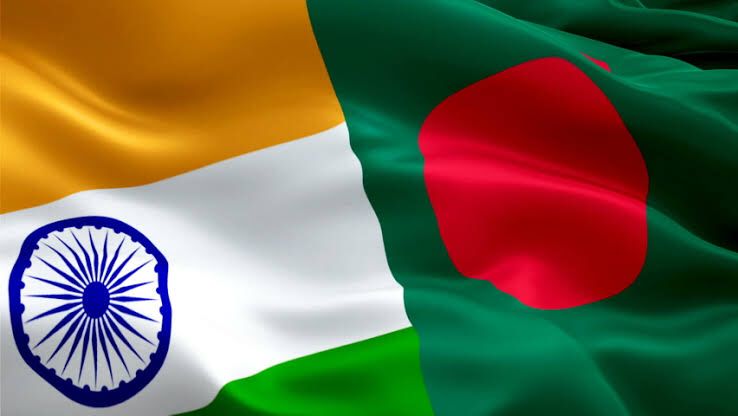The Indian stand on Bangladesh and the forthcoming elections in that country was made clear by Foreign Secretary Vinay Mohan Kwatra following the conclusion of the India-US 2+2 Ministerial Dialogue in Delhi on November 10.
Implicit in Kwatra’s statement was the general belief that irrespective of the national and international political situation, India, as a “close friend and partner”, was committed to the ruling Awami League regime under Sheikh Hasina.
It was also sought to be conveyed to a wider audience that India “respects the democratic process in Bangladesh and will continue to support the country’s vision of a stable, peaceful and progressive nation”.
New Delhi has been consistent in its support for the Sheikh Hasina-led Awami League which, in more realistic terms and in the prevailing political environment in Bangladesh, has become increasingly unpopular.
In as much as India has provided unstinted support to Sheikh Hasina, the Bangladesh prime minister has always parroted a narrative that only her regime is capable of ensuring security in India’s northeast and is a bulwark against extremist forces inimical to New Delhi’s interests.
That was in the past and Sheikh Hasina’s government of the time did help contain Indian insurgents. But to continue to raise the spectre of such an emergent threat now would be an exaggeration.
The problem with such an explanation is that the Sheikh Hasina regime itself has been responsible for the rise, expansion and deepening of Islamist forces in Bangladesh, a development that India has, inexplicably, ignored or turned a blind eye to.
A few stark examples should make this point glaringly obvious. On April 17 this year, the Dhaka Tribune reported that Sheikh Hasina inaugurated 50 “more model mosques and Islamic cultural centres across the country in the fourth phase, joining virtually from her official residence Ganabhaban”.
Sheikh Hasina, the newspaper reported, “has so far” inaugurated 200 of 564 such mosques built at a cost of Tk 9,435 crore. This mosque-building spree “is scheduled” to end by June 2024.
Recent statistics suggest that there are an estimated 20,000 qawmi and nearly 4,000 ebtedayi madrassas or seminaries across Bangladesh.
Besides these, media reports last year indicated that as many as 3,534 high school madrassas were “attached to primary sections”.
“It is this seeping Islamisation and growing fundamentalism as reflected in the politics of the Hefazat-e-Islam and Islami Andolan Bangladesh that must worry India. Sheikh Hasina is the daughter of Sheikh Mujibur Rahman, yet she has contributed to this unprecedented Islamist explosion in a country that was principally founded on secular values,” said an Awami League leader who did not wish to be identified lest he is made a target of retribution.
There have been occasions in the past when the Awami League has flirted with even its putative enemy, the Jamaat-e-Islami (JeI), several of whose pro-Pakistani leaders suspected to have played murderous roles in the 1971 liberation movement were hanged a few years ago.
More recently, the JeI, whose registration as a political party was judicially annulled in 2013, held several smaller rallies in Dhaka in the recent past before being allowed to assemble in huge numbers in central Dhaka on October 28.
Now, cut to November 9 when the Indian Ministry of External Affairs spokesperson, responding to a query from a reporter, admitted that his country “respects the democratic process in Bangladesh”.
It is not surprising that India will champion Sheikh Hasina’s cause no matter how unpopular, undemocratic and repressive her regime has been since at least 2014.
India is politically invested in the Awami League, and it was for this very reason that it supported the party’s electoral efforts in 2014 and 2018 when duplicity, deception, subterfuge and fraud were employed and deployed in equal measure to keep her in power.
And each time, newer and novel means were conjured up and practiced with frightening results for Bangladeshis.
The “ballot stuffing” of 2018 is etched in the collective memory of most Bangladeshis who talk openly about the “midnight exercise of franchise” following which New Delhi lost no time to congratulate Sheikh Hasina for the victory.
“Was it an example of a healthy democracy and a democratic function?” asks the Awami League leader cited above, questioning India’s respect for the democratic process in Bangladesh.
In 2014, India backed the Sheikh Hasina regime when her Awami League won 153 of 300 seats uncontested, making a mockery of the principles of democratic equity, constitutional probity and rule of law.
Indeed, entwined as it is with an unpopular Awami League, India has fallen from the estimation of many Bangladeshis who don’t shy away from equating it with a state which at best is in a “client-patron” relationship with Sheikh Hasina’s party.
There has been not a squeak, let alone a word, of protest from New Delhi insofar as Dhaka’s repressive measures are concerned. There has been no official condemnation of the countrywide repressive measures against the Bangladesh Nationalist Party (BNP), especially its top-rung leadership.
India has also maintained a cynical silence on rampant corruption in Bangladesh, especially by a clique of oligarchs who have a firm grip on the levers of government and its security agencies, and has preferred to wink at untold human rights violations involving enforced disappearances.
A “close friend and partner” has chosen to play ball with a much despised and loathed regime. The who-else-but-Hasina card has become overused and frayed and India must explore new options should it prefer to continue to remain an influential and persuasive friend.
Last month, Ahsan H Mansur, a much-respected Bangladeshi economist and BRAC Bank Chairman, told Northeast News that India must focus on protecting the country’s national and not regime interest.
Around the same time, an MEA spokesperson, addressing a gathering of Bangladeshi journalists, offered platitudes, saying that India’s “relation is with Bangladesh, with its people, not with any particular party”.
And yet India’s stand on November 10 reflected that it was willing to continue supporting the ruling Awami League. Perhaps it has a grand design to pave the return to power of Sheikh Hasina when most Bangladeshis want a free, fair, participatory and inclusive election.
Obsessive-compulsive relationships often end up in disastrous consequences for one or both parties.















